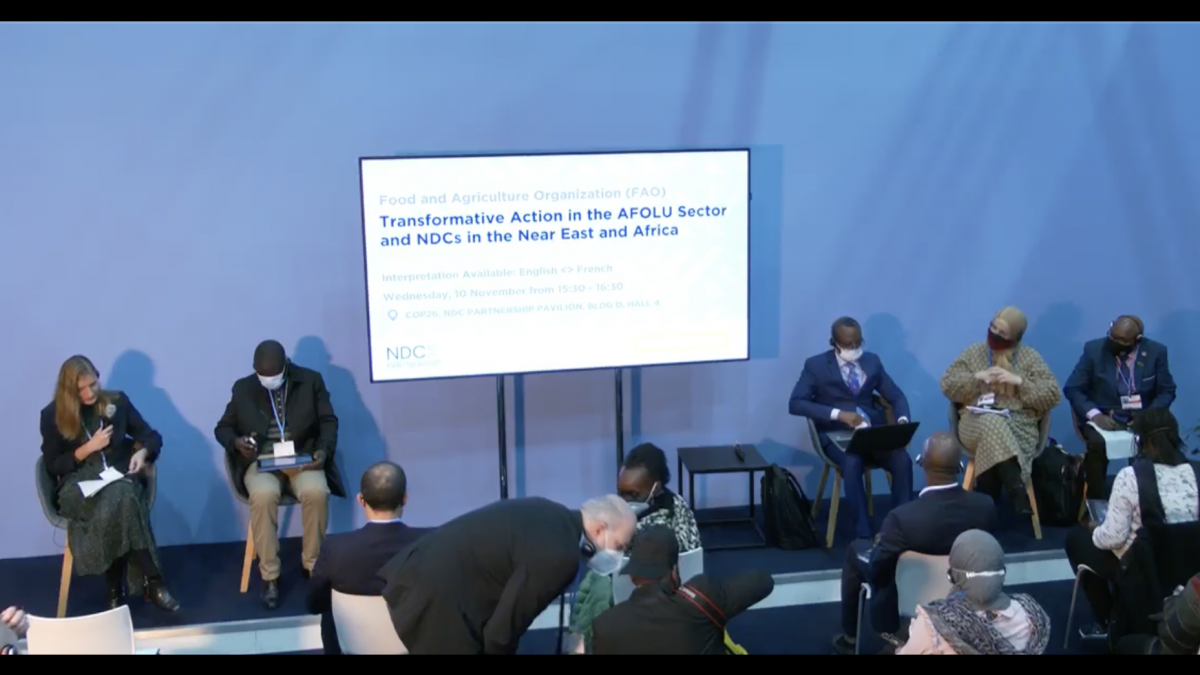FAO convened several discussions during the second week of the Glasgow Climate Change Conference (UNFCCC COP 26)
An event on 8 November explored the ways in which emissions-intensive sectors, like agriculture and land use, can decarbonize, and how can the private sector help. It introduced a new private sector facility for climate action in agriculture and land use. The event, Engaging the private sector to implement agriculture and land use priorities of NDCs and NAPs, brought together private sector actors in the agriculture and land use sectors to discuss their work in developing public-private partnerships based on Nationally Determined Contributions (NDCs) and National Adaptation Plans (NAPs). It was organized by the Scaling up Climate Ambition on Land Use and Agriculture (SCALA) programme, which is jointly run through the FAO and t(UNDP.
Participants at a 9 November event discussed the requirements for a green and climate-resilient agriculture sector to emerge. They identified the need for an integrated approach across thematic areas as well as at the institutional level, and ensuring that local work is supported by coherent government policies as well as adequate financing options.
- John Kerry, US Special Presidential Envoy on Climate, underscored the critical role of the agriculture and food sectors for achieving the global emissions goal of net zero by 2050.
- Xiaoling Yang, on behalf of Xie Zhenhua, Special Envoy for Climate Change, China, highlighted that more than half of the world’s population makes its living through food systems, including its production and the supply/value chains.
- In closing remarks, Maria Helena Semedo, FAO Deputy Director-General, called for system-based approaches in food production with greater socio-economic benefits, less impact on the environment, and more resilience against shocks and threats.
An event on 10 November, titled Voices from the Field: Participatory Approaches of Climate Smart Agriculture Practices (CSA), Farmer Field Schools (FFS) and indigenous Chakra Systems, highlighted the potential of community-based, bottom-up strategies in agriculture to implement and scale up climate change commitments. Participants noted: the potential merits of agroecology compared to other forms of CSA that may include soil-degrading chemicals; the need to integrate science and traditional knowledge and how best to do this; and best practices in the implementation of sustainable agriculture.
- Participants then viewed a video on cocoa production in Ecuador. Geovanny Enriquez, FAO Ecuador, elucidated further, saying Amazonian Kichwa farmers, particularly women, have created a Chakra label for their cocoa agroforestry that increases resilience of the forest and provides other food and medicinal products.
- Participants also watched a video on agroecology and FFS in Andhra Predash, India. This was followed by Vijay Kumar, Government of Andhra Pradesh, presenting on an agroecological transition for all six million farmers in the region using existing self-help collectives that also address social issues. He said: farmers have been told for 50 years that crops cannot grow without synthetic materials; everyone must cooperate to achieve the required change, including civil society and farmer champions; and governments and institutions must check theories against on-the-ground reality.
Another 10 November event discussed transformative action in the AFOLU sector and NDCs in the
Near East and Africa. It highlighted the findings of a FAO regional analysis of NDCs for countries in the Near East and North Africa (NENA) and Sub-Saharan Africa (SSA), and presented updates on countries’ revised NDCs for 2021 and actions undertaken to respond to challenges faced in the agriculture, forestry, and other land use (AFOLU) sectors. The event sought to: provide a platform for sharing and advocacy on enhancing NDC coordination processes among sectors; explain how the UNFCCC’s Koronivia Joint Work on Agriculture supports better integration and stronger agricultural priorities in NDCs.
- Lamine Diatta said Koronivia is the first window within the UNFCCC to consider agriculture as a systemic approach to deliver climate action on the ground through all its workstreams, bodies, and financial entities. He noted it will encourage donors and others to consider agriculture in their funding mechanisms and countries to undertake more work in their agriculture and forestry sectors. He stressed integrating agriculture with, inter alia, water, mitigation and adaptation, and food security.
6 November 2021. Forests, Trees and Agroforestry: From a Decade of Research to a Decade of Impacts
The CGIAR Research Program on Forests, Trees and Agroforestry is wrapping (FTA) wrapped-up a decade of research 2011-2021 and looking for the future: investigating new research and new knowledge needed, but also how to bring it to action on the ground. This also requires new partnerships. A push for action does not mean that the research period is over, but that research needs to be embedded into action.



No comments:
Post a Comment